Top 10 Worst Roman Emperors
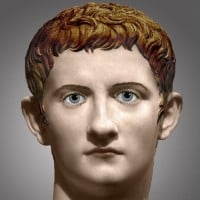 Known for his erratic behavior and brutal rule, Caligula's reign is marked by extreme extravagance, arbitrary executions, and an alarming tendency to proclaim himself a god. His despotic ways and apparent insanity led to widespread discontent, and his assassination was seen as a relief to Rome.
Known for his erratic behavior and brutal rule, Caligula's reign is marked by extreme extravagance, arbitrary executions, and an alarming tendency to proclaim himself a god. His despotic ways and apparent insanity led to widespread discontent, and his assassination was seen as a relief to Rome. Horrible. Just plain horrible. This guy thought he was a God. He also punished anyone who opposed him. As if THAT wasn't bad enough, he also doted on his own sister.
The guy slept with his sisters! And I see no reason for Augustus to be on this list!
Caligula had major brain damage.
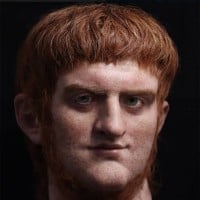 Nero's rule was tainted by extravagance, tyranny, and allegations of setting the Great Fire of Rome. His persecution of Christians and erratic behavior, along with his obsession with arts over governance, contributed to his reputation as one of the most notoriously bad emperors.
Nero's rule was tainted by extravagance, tyranny, and allegations of setting the Great Fire of Rome. His persecution of Christians and erratic behavior, along with his obsession with arts over governance, contributed to his reputation as one of the most notoriously bad emperors. Nero was a maniac. He massacred christians in great numbers, took huge funds to build himself monuments, and was all around a total nutcase.
Basically the Roman equivalent of Hitler. He massacred thousands of innocent Christians for no reason. Absolutely horrible
Was it true he fiddled while he watched the city burn?
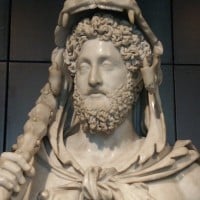 Often depicted as a self-indulgent ruler, Commodus saw himself as a reincarnation of Hercules. His reign was filled with scandal, corruption, and a disinterest in the affairs of the state. His behavior led to political instability and ultimately resulted in his assassination.
Often depicted as a self-indulgent ruler, Commodus saw himself as a reincarnation of Hercules. His reign was filled with scandal, corruption, and a disinterest in the affairs of the state. His behavior led to political instability and ultimately resulted in his assassination. Just about as bad as they come. Focused too much on screwing around as a gladiator to even care about the health and safety of his empire. He's a also a depraved, paranoid psychopath who killed anyone who stood in his way, purging the senate to the point that it became a bunch of incompetent yes-man goons. Quite the contrast from his cerebral, sober-minded father Marcus Aurelius.
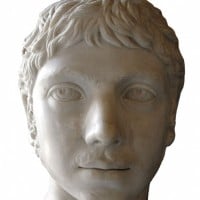 Famous for his religious fanaticism and sexual excesses, Elagabalus's rule was marked by a complete disregard for Roman traditions and political norms. His attempts to replace traditional Roman religion with his own led to widespread discontent, resulting in his murder at a young age.
Famous for his religious fanaticism and sexual excesses, Elagabalus's rule was marked by a complete disregard for Roman traditions and political norms. His attempts to replace traditional Roman religion with his own led to widespread discontent, resulting in his murder at a young age. Executed many innocents, enforced a religion unfamiliar to all of Rome, prostituted himself. Augustus doesn't belong here at all, but Elagabulus does.
Should be in the top 5. Ya, of course a gender confused teenager would make a great emperor.
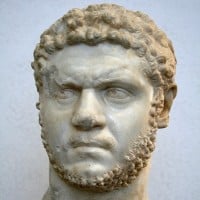 Caracalla's rule is notorious for the massacre of thousands in Alexandria and his enactment of the Constitutio Antoniniana, which was economically taxing on the empire. His obsession with Alexander the Great and despotic ways led to widespread resentment and a negative legacy.
Caracalla's rule is notorious for the massacre of thousands in Alexandria and his enactment of the Constitutio Antoniniana, which was economically taxing on the empire. His obsession with Alexander the Great and despotic ways led to widespread resentment and a negative legacy. I can't believe that I had to add him. He wasn't as evil as Caligula or Nero, but he killed more than them.
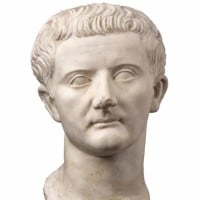 Although a capable military leader, Tiberius's reign was marked by paranoia and cruelty, especially in his later years. His use of treason trials to execute rivals, along with his withdrawal from public life, left a lasting impression as a tyrannical and aloof ruler.
Although a capable military leader, Tiberius's reign was marked by paranoia and cruelty, especially in his later years. His use of treason trials to execute rivals, along with his withdrawal from public life, left a lasting impression as a tyrannical and aloof ruler.
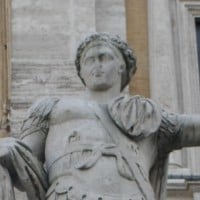 Constantine II's short reign is characterized by his conflict with his brothers over territorial disputes. His aggressive attempt to take control over his brother Constans' territory led to a civil war, which resulted in his death, leaving a reputation of greed and rash decision-making.
Constantine II's short reign is characterized by his conflict with his brothers over territorial disputes. His aggressive attempt to take control over his brother Constans' territory led to a civil war, which resulted in his death, leaving a reputation of greed and rash decision-making.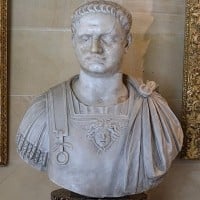 Domitian's authoritarian rule and tendencies to persecute those he viewed as enemies have colored his legacy. His heavy taxation and autocratic behavior led to dissatisfaction among the Senate and the nobility, culminating in a conspiracy that led to his assassination.
Domitian's authoritarian rule and tendencies to persecute those he viewed as enemies have colored his legacy. His heavy taxation and autocratic behavior led to dissatisfaction among the Senate and the nobility, culminating in a conspiracy that led to his assassination.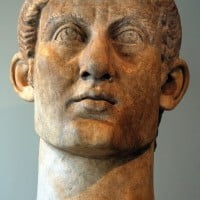 While renowned for his conversion to Christianity and the Edict of Milan, Constantine I's rule had its dark sides. His involvement in the killings of his son Crispus and wife Fausta, along with internal family conflicts, has led some to view aspects of his rule critically.
While renowned for his conversion to Christianity and the Edict of Milan, Constantine I's rule had its dark sides. His involvement in the killings of his son Crispus and wife Fausta, along with internal family conflicts, has led some to view aspects of his rule critically.
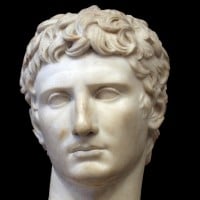 Although Augustus laid the foundation for the Roman Empire, some critics point to his seizure of power and undermining of the Roman Republic's principles. His consolidation of authority into his own hands and manipulation of political processes have been viewed negatively by some historians.
Although Augustus laid the foundation for the Roman Empire, some critics point to his seizure of power and undermining of the Roman Republic's principles. His consolidation of authority into his own hands and manipulation of political processes have been viewed negatively by some historians.
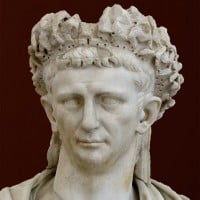 Despite accomplishments like the conquest of Britain, Claudius was often perceived as weak and easily manipulated, particularly by his wives and freedmen. His stuttering and apparent physical disabilities led to personal ridicule, further diminishing his reputation in the eyes of some contemporaries and historians.
Despite accomplishments like the conquest of Britain, Claudius was often perceived as weak and easily manipulated, particularly by his wives and freedmen. His stuttering and apparent physical disabilities led to personal ridicule, further diminishing his reputation in the eyes of some contemporaries and historians.
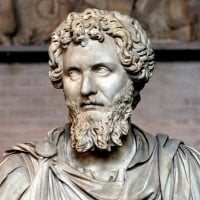 His rule is marked by military despotism and a focus on strengthening the power of the army. Septimius Severus' harsh measures against opponents and the neglect of the traditional Roman Senate contributed to a legacy of authoritarian rule.
His rule is marked by military despotism and a focus on strengthening the power of the army. Septimius Severus' harsh measures against opponents and the neglect of the traditional Roman Senate contributed to a legacy of authoritarian rule.
This guy killed and Slaughtered All!
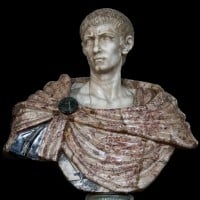 Known for his Diocletianic Persecution, the last and most severe persecution of Christians in the Roman Empire, Diocletian's rule is often criticized for its brutal suppressive measures. His economic reforms, while intended to stabilize, led to significant hardship and dissatisfaction.
Known for his Diocletianic Persecution, the last and most severe persecution of Christians in the Roman Empire, Diocletian's rule is often criticized for its brutal suppressive measures. His economic reforms, while intended to stabilize, led to significant hardship and dissatisfaction. People like to criticize Nero for his cruelty to the Christians. They are right for this. But under Diocletian persecution was the most severe and widespread.
Responsible for the bloodiest religous persecution of Christianity in history.
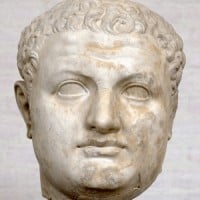 Although his reign was brief, Titus faced criticism for his handling of the eruption of Mount Vesuvius and the Great Fire of Rome. However, these events may have been beyond his control, and many modern historians view him more favorably, making him an ambiguous figure in Roman history.
Although his reign was brief, Titus faced criticism for his handling of the eruption of Mount Vesuvius and the Great Fire of Rome. However, these events may have been beyond his control, and many modern historians view him more favorably, making him an ambiguous figure in Roman history.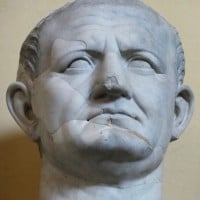 Despite being known for restoring stability after the Year of the Four Emperors, Vespasian's imposition of taxes, including on public urinals, led to some unpopularity. However, many of his so-called negative traits may be attributed to later propaganda and not universally accepted.
Despite being known for restoring stability after the Year of the Four Emperors, Vespasian's imposition of taxes, including on public urinals, led to some unpopularity. However, many of his so-called negative traits may be attributed to later propaganda and not universally accepted.This was the original fanatical Christian who got butt hurt over Christianity being criticized. Not only did he make Christianity the official religion of the Empire, but he literally BANNED EVERY OTHER RELIGION, even Hellenism, which was the Empire's main religion for centuries! If you're wondering why Christianity is the big religion today, look no further than this selfish arsehole.
Although he helped make Christianity the official religion he was against Arianism and brought his pagan beliefs to Christianity with the Trinity.
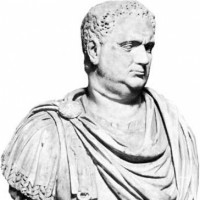 Known for his gluttony and extravagance, Vitellius quickly lost favor through his mismanagement of the empire and inability to control his supporters. His reign ended in chaos and violence, culminating in his brutal execution after just eight months in power.
Known for his gluttony and extravagance, Vitellius quickly lost favor through his mismanagement of the empire and inability to control his supporters. His reign ended in chaos and violence, culminating in his brutal execution after just eight months in power.